Emile

Annotation
French philosopher Jean-Jacques Rousseau wrote the philosophical treatise Emile, or On Education in 1762. In it, he imagines a situation in which a young tutor devotes 20 years to raising a single child. In the process, Rousseau lays out many of his fundamental beliefs about the nature of humans and their relationship to society.
Text
Nature wants children to be children before they are men. If we deliberately pervert this order, we shall get premature fruits which are neither ripe nor well-flavored, and which soon decay. . . Childhood has ways of seeing, thinking, and feeling peculiar to itself; nothing can be more foolish than to substitute our ways for them.
A child's worth increases with his years. To his personal value must be added the cost of the care bestowed upon him; to the loss of his life is joined in him the sentiment of death. It is therefore above all of the future that we must think in watching over his conservation; it is against the ills of childhood that he must be armed even before he gets there. For if the value of life increases until the child reaches an age when he can be useful, is it not crazy to spare some suffering in infancy only to multiply his pain when he reaches the age of reason?
The child's first sentiment is to love himself, and the second, which derives from the first, is to love those around him. For in his present state of weakness he is aware of people only through the help and attention he receives from them. At first his affection for his nurse and his governess is mere habit. He seeks them because he needs them and because it feels good to have them; it is more like consciousness than benevolence. He needs a long time to understand that not only are they are useful to him but that they want to be useful to him. It is then that he begins to love them. Nature exercises children continually, it hardens their temperament by all kinds of difficulties, it teaches them early the meaning of pain and sorrow. Teething gives them fevers, sharp colics bring on convulsions, long coughing suffocates them, worms torment them, plethora corrupts their blood, various leavens ferment it and cause dangerous eruptions. Almost all of the first age is sickness and danger: one half of the children who are born die before their eighth year. The tests passed, the infant has gained strength, and as soon as he can make use of his life its principle becomes more secure.
Credits
Rousseau, Jean-Jacques. Emile. New York: E. P. Dutton, 1969. Quoted in Barbara Kaye Greenleaf. Children through the ages: a history of childhood (New York: McGraw-Hill, 1978), 64, 67, 755.